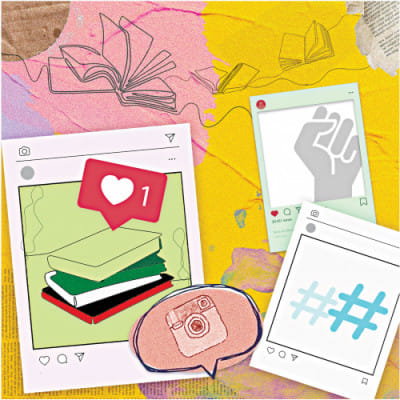How bookstagram is keeping humanity alive

Since I am a bookstagram novice, mostly watching, listening, and rarely creating content of my own, I feel a kind of motivation from this community to speak my mind about issues that have always been close to my heart. One such issue has been gender inequality and misogyny. Instagram has given feminists and advocates a platform to question patriarchy. It has taken the platform and transformed it into a looking glass that focuses on the core of the problem.
Fiction speaks louder to me, so it's no surprise that authors like Chitra Banerjee Divakaruni, Arundhati Roy, and Chimamanda Ngozi Adichie have most effectively brought out to me the stories and experiences of women who have lived through gender bias, sometimes with quiet courage, sometimes with fierce bravery. Bookstagram accounts like @wellreadblackgirl, @tea_with_c, @zainub.reads, @shesreadingtheworld, and @intersectionalbookclub have also introduced me to books that highlight intersectional feminism and how "smashing the patriarchy" can mean different things in different parts of the world.
"It's okay not to be okay". It's okay to seek help. It's okay to just be. As May was Mental Health Awareness month, my Instagram feed in recent weeks was full of book recommendations on mental health. Recommendations apart, the community has also helped innumerable booklovers to deal with their own trauma and mental health issues by connecting with like-minded booklovers, by reading and listening to each other and validating each other's feelings. Some accounts worth following for mental health awareness are @sahilpr1109, @projectpurplebd, @cholokothaboli, @wevegonemental and @lenalangcoach.
In the last few weeks, however, the biggest role bookstagram has played is in alerting the world of the crimes against humanity being committed in Palestine. While some of us feel helpless, wondering what we can do from across the world to ease their suffering, wondering whether our single voice is significant enough to make a difference in the larger scheme of things, the bookstagram community has risen to the occasion.
Bookstagrammers have extensively spread news of what is happening in Palestine on the ground, and some of them like @onthesamepagewithcats, @gentlemoonpages and @onlyfoxtales organised charities that combined monetary aid with spreading awareness. They reached readers all over the world simply by stacking books in the colours of the Palestinian flag and by using the right hashtags, even going against the platform's algorithm and reducing their online "reach" in doing so.
Others, like @the_romantic_baker and @thebookishbox, generously joined in and managed to raise a few thousand dollars in donations from every corner of the world. The recent ceasefire has barely dulled the fervour of this community as they read and recommend literature from and about Palestine and Palestinians. The UK-based @books_for_gaza has organised a donation drive to collect books in order to rebuild the bookshop and library owned by Samir Mansour, which was destroyed during airstrikes in Gaza. One can also visit @samir_mansour_bookshop for the link to his GoFundMe that will help in rebuilding it.
With time, I've realised that there is much more to bookstagram than sharing book reviews, recommendations, and aesthetically pleasing photos. It is a community of mostly non-judgmental souls who are fearless in challenging norms and opening themselves up to conflicting viewpoints. They are invested citizens of the world who are willing to learn and unlearn with equal zeal. In a time of ceaseless violence and natural threats and disasters, when social media is known so often for triggering anxiety and other mental health issues, bookstagram, to a great extent, is keeping humanity alive.
Tasneem Tambawala is a teacher, librarian, and founder of the Bookcentric library in Dhaka. Reach her at [email protected] or @tasneemtreads on Instagram.

 For all latest news, follow The Daily Star's Google News channel.
For all latest news, follow The Daily Star's Google News channel. 



Comments